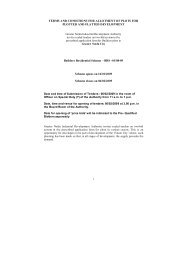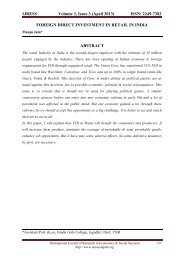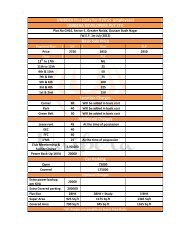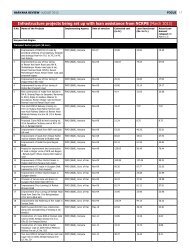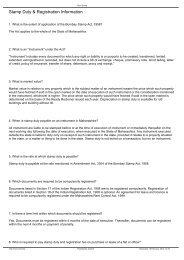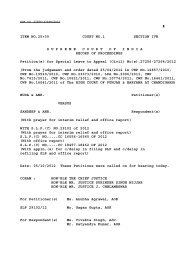eLegalix - Allahabad High Court Judgment Information System ...
eLegalix - Allahabad High Court Judgment Information System ...
eLegalix - Allahabad High Court Judgment Information System ...
Create successful ePaper yourself
Turn your PDF publications into a flip-book with our unique Google optimized e-Paper software.
JUDGMENT/ORDER IN - WRIT - C No. 37443 of 2011 at <strong>Allahabad</strong> Dated-21.10....http://elegalix.allahabadhighcourt.in/elegalix/WebShow<strong>Judgment</strong>.doPage 172 of 19710/21/2011any fault in the approach adopted by the <strong>High</strong> <strong>Court</strong>."Learned counsel for the intervenors has relied on the judgment of the Apex <strong>Court</strong> in Commissioner of Income Tax(supra) in which case the Apex <strong>Court</strong> observed that since the facts asserted in the affidavit of the assessee werenot disputed by the revenue, it appears that the revenue had waived its right to dispute the facts. Following wasobserved by the Apex <strong>Court</strong> in paragraph 10 which is quoted below:-"10. The assessments relate to a period about a quarter of century back and by its conduct, the revenue appearsto have waived its right to dispute the facts asserted in the affidavit on one hand by not challenging itsadmissibility and on the other, by not disputing the context thereof."Another judgment relied on by the learned counsel for the intervenors is Rajendra Singh's case (supra) in whichcase the Apex <strong>Court</strong> has laid down that a mandatory provision conceived in the interest by a party can be waivedby that party, whereas a mandatory provision conceived in the interest of the public cannot be waived by him.Following observation were made in paragraph 6 which is quoted below:-"6. While examining complaints of violation of statutory rules and conditions, it must be remembered that violationof each and every provision does not furnish a ground or the <strong>Court</strong> to interfere. The provision may be a directoryone or a mandatory one. In the case of directory provisions, substantial compliance would be enough. Unless it isestablished that violation of a directory provision has resulted in loss and/or prejudice to the party, no interferenceis warranted. Even in the case of violation of a mandatory provision, interference does not fellow as a matter ofcourse. A mandatory provision conceived in the interest of a party can be waived by that party, whereas amandatory provision conceived in the interest of public cannot be waived by him. In other wards, wherever acomplaint of violation of a mandatory provision is made, the <strong>Court</strong> should enquire- in whose interest is theprovision conceived. If it is not conceived in the interest of public, question of waiver and/or acquiescence mayarise - subject, of course, to the pleadings of the parties. This aspect has been dealt with elaborately by this <strong>Court</strong>in State Bank of Patiala v. S.K. Sharma and in Krishanlal v. State of Jammu and Kashmir on the basis of a largenumber of decision on the subject. Though the said decisions were rendered with reference to the statutory Rulesand statutory provisions (besides the principles of natural justice) governing the disciplinary enquiries involvinggovernment servants and employees of statutory corporation, the principles adumbrated therein are of generalapplication. It is necessary to keep these considerations in mind while deciding whether any interference is calledfor by the <strong>Court</strong> whether under Article 226 or in a suit. The function of the <strong>Court</strong> is not a mechanical one. It isalways a considered course of action."There cannot be any dispute to the proposition as laid down above, but in the present cases, petitioners have notwaived any mandatory statutory provision as observed above. The above case does not help the petitioners inany manner.The next judgment relied on by the learned counsel for the intervenors is the judgment of the Apex <strong>Court</strong> in M. C.Mehta Vs. Union of India & Ors, (1999) 6 SCC 237.In the aforesaid said case, the <strong>Court</strong> was considering whether the question of waiver of notice came up forconsideration in context of principles of natural justice. Following was observed in paragraph 22 which is quotedbelow:-"22.We may also state that there is yet another line of cases as in State Bank of Patiala v. S.K. Sharma, RajendraSingh v. State of M.P. that even in relation to statutory provisions requiring notice, a distinction is to be madebetween cases where the provision is intended for individual benefit and where a provision is intended to protectpublic interest. In the former case, it can be waived while in the case of latter, it cannot be waived."Insofar as the submission of the learned counsel for the petitioners that some of the land owners/petitioners whowere allotted 6 % Abadi Plots/flats have sold their plots to third party, we are of the view that the mere fact thatthey have sold their Abadi plots/flats allotted to them does not mean that they have waived all their rights tochallenge the acquisition. As we have noticed above, that most of the petitioners have taken the ground in the writpetition that they were under bonafide belief that acquisition has been made for Planned Industrial Developmentand when it came to their knowledge that the purpose has been diverted and the land has been transferred toprivate parties they invoked the jurisdiction of this <strong>Court</strong>.In these circumstances, we are of the view that it cannot be presumed that the petitioners/land owners havewaived their rights and cannot be non-suited on the ground that they have waived their rights to challenge theacquisition.





